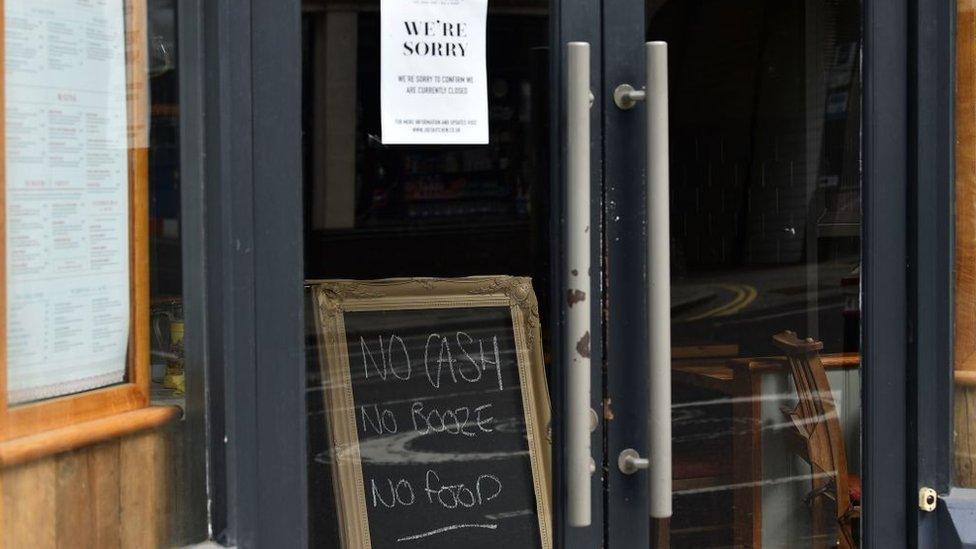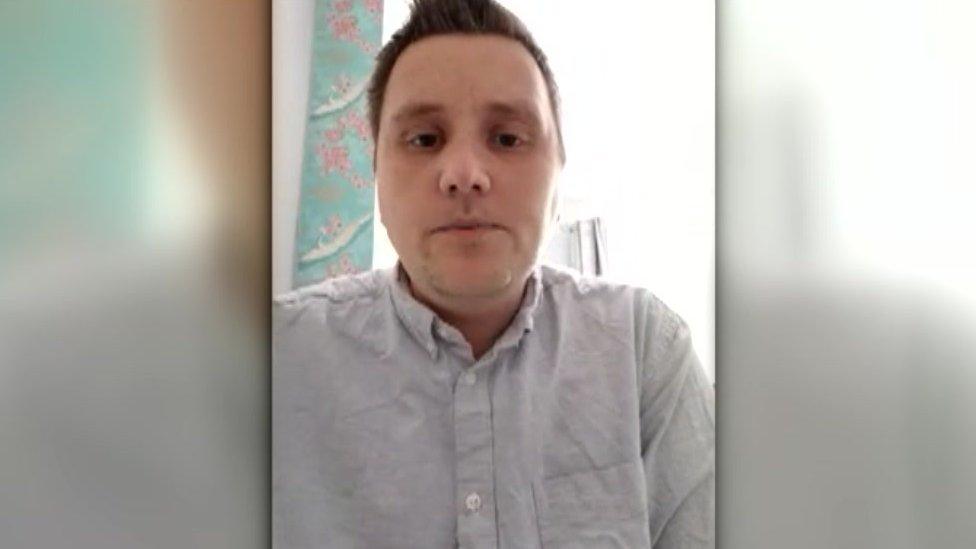Coronavirus: Furlough extension 'bad news' for new starters
- Published

Extending the furlough scheme is "bad news" for new starters not eligible for support, a politician has said.
Plaid Cymru Member of the Senedd (MS) Helen Mary Jones said it meant they were "unable to work and not getting any money until the autumn".
The Treasury said those not eligible could make use of other measures including the "welfare safety net".
A quarter of the UK's workforce has been furloughed on the Job Retention Scheme since the lockdown started.
About 7.5 million people are now having 80% of their wages, up to £2,500 per month, paid for by the UK government.
On Tuesday, Chancellor Rishi Sunak announced the scheme would be extended to October, but companies would be asked to start sharing the cost of the scheme from August.
But some people who had just started new jobs, or were about to, are not eligible for support because they had not had an RTI (Real-Time Information) submission, or payslip, sent to HM Revenue and Customs before the cut-off date of 19 March.
'A real struggle'

Gareth Clements says he's had "zero income" for the past two months
Gareth Clement works for EE in Pontypridd and started his job on 13 March, but his pay day was 25 March so he "missed the RTI submission by six days".
"For the last two months I've had zero income," he said.
"My wife, who is a support worker, is currently working so she's had to pick up extra shifts to try and cover the shortfall of my wages.
"It's putting a massive strain on us. I've got a two-year-old who I'm at home with at the moment.
"It's a real struggle... waking up every day and knowing you've got nothing coming in."
Many in this situation have had to take unpaid leave, try to find new work or claim Universal Credit.
But for people like Mr Clement, who are still employed, claiming Universal Credit is not an option.
"My employer's been really good. They've kept the job open for me so they've been really good and it's a reassurance knowing I have a job to go back to.
"But, personally, it's a massive, massive struggle on my mental health, not knowing when my next money's coming in.
"I can't claim Universal Credit, I can't claim Jobseekers. So there's no help for me whatsoever."
Ms Jones said she had received messages from "hundreds" of people on social media affected by this issue.
"Some of the stories are really quite heartbreaking," she said.
"I can understand that the simple way to begin to evidence the scheme was payroll.
"But now that's done and that's all been verified, it can't be impossible to work out a scheme whereby if people can genuinely prove that they were employed - a contract, or a letter of appointment - with evidence from the employer.
"I really don't see why they can't be included."
'It's extremely difficult'

Tiffany Elliott-Harrison: "It really does take a toll on your self esteem"
Tiffany Elliott-Harrison, from Saltney, Flintshire, was due to start new job on 2 April working for a hospice in Chester, but she was unable to due to coronavirus.
She is "currently lasting on savings and £74 a week Jobseekers' Allowance".
"It's extremely, extremely difficult knowing that my husband is trying to keep a roof over our heads and I've not got an income coming in.
"It really does take a toll on your self-esteem, your self-confidence and your mental health."
She would like people in her position to be able to access support in the same way self-employed people can through a new grant scheme.
"We can prove we were leaving jobs to start new jobs. We've got contracts of employment," she said.
"If you use our HMRC records, which can't be fudged, it should be easy to provide us with an income."

A SIMPLE GUIDE: How do I protect myself?
AVOIDING CONTACT: The rules on self-isolation and exercise
WHAT WE DON'T KNOW How to understand the death toll
TESTING: Can I get tested for coronavirus?
LOOK-UP TOOL: Check cases in your area

Ms Jones said: "If we can't sort this out at a UK level I really hope the Welsh Government will step in and give the people here in Wales some kind of support."
The Welsh Government said: "It is pointless to pretend that within our current financial settlement we can make good any failing of the Job Retention Scheme, external, though we try to meet the most immediate needs of individuals through our Discretionary Assistance Fund, external."
A Treasury spokesman said: "The coronavirus Job Retention Scheme has protected more than 7.5 million jobs through this crisis.
"Those that aren't eligible for the scheme can make use of a number of other measures.
"These include our strengthened welfare safety net, where we've given councils an additional £500m to support the most vulnerable in our society, and introduced mortgage-payment holidays and tax deferrals."
- Published15 May 2020

- Published15 May 2020

- Published7 May 2020
